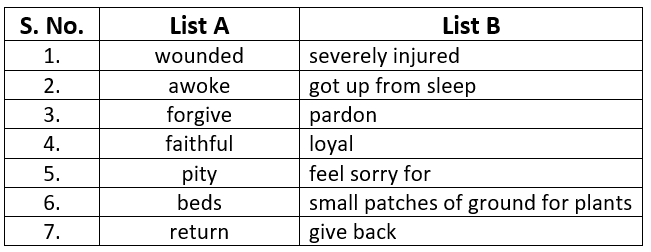NCERT Solutions for Class 7 English - Three Questions
| Table of contents |

|
| NCERT Textbook Page No. 10 |

|
| NCERT Textbook Page No. 14 |

|
| NCERT Textbook Page No. 15 |

|
| NCERT Textbook Page No. 16 |

|
NCERT Textbook Page No. 10

Q1: Why did the king want to know the answers to three questions?
Ans: The king wanted to know answers to three questions so that he could make wise decisions and he would never fail. He believed that knowing the right time to act, the most important people to consult, and the crucial tasks to focus on would guide him in making the best choices.
Q2: Messengers were sent throughout the kingdom:
(i) to fetch wise men.
(ii) to find answers to the questions.
(iii) to look for the wise hermit.
(iv) to announce a reward for those who could answer the questions.
Mark your choice.
Correct Answer is Option (iv)
Messengers were sent throughout the kingdom to announce a reward for those who could answer the questions.
NCERT Textbook Page No. 14

Q1: Complete the following sentences by adding the appropriate parts of the sentences given in the box.
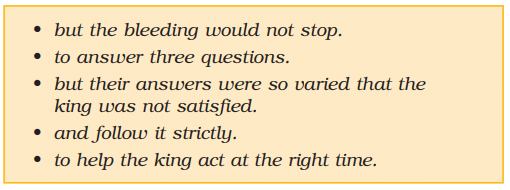
(i) Many wise men answered the king's questions, ______.
Ans: Many wise men answered the king's questions, but their varied responses left the king unsatisfied.
(ii) Someone suggested that there should be a council of wise men, ______.
Ans: Someone suggested forming a council of wise men to assist the king in making timely decisions.(iii) Someone else suggested that the king should have a timetable ______.
Ans: Someone else suggested that the king should have a timetable to follow it strictly.(iv) The king requested the hermit ______.
Ans: The king requested the hermit to answer three questions.(v) The king washed and dressed the bearded man's wound ______.
Ans: The king washed and dressed the bearded man's wound, but the bleeding would not stop.
 Answer the following questions:
Answer the following questions:
Q1: Why was the king advised to go to magicians?
Ans: The king was advised to consult magicians because they were thought to have the power to foresee the future. By understanding what lay ahead, the king could make better decisions regarding his actions.
Q2: In answer to the second question, whose advice did the people say would be important to the king?
Ans: The second question was:"Which people should he listen to?"
Suggestions made in answer to the second question:
Some people said the councillors: They believed that the king’s advisors were essential for guiding him effectively.
Others suggested the priests: This group felt that the priests’ spiritual insight and guidance were crucial for the king's decisions.
A few chose the doctors: They argued that the advice of doctors was important for maintaining the king's health and the health of his people.
Some people emphasized the soldiers: They believed that listening to the soldiers was vital for matters of defense and security.
Varied opinions: Overall, the responses differed significantly, indicating that people had diverse views on whose advice was most important for the king.
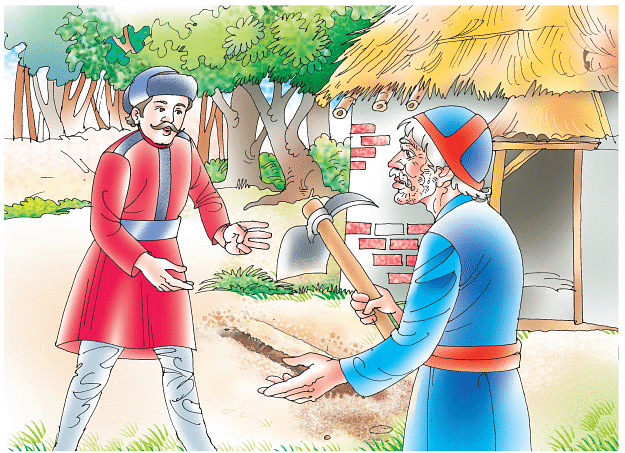
Q3: What suggestions were made in answer to the third question?
Ans: In response to the third question, various suggestions were made. Some individuals believed that science was the most important focus, arguing that understanding scientific principles is vital for making informed decisions. Others advocated for fighting, asserting that strength and readiness for battle were paramount for the king. Additionally, a few suggested that religious worship was essential, as it helps a king connect with the divine. Overall, the differing opinions highlighted the diverse perspectives on what the king's most important task should be.
Q4: Did the wise men win the reward? If not, why not?
Ans:
No, the wise men did not win the reward. Each wise man gave different answers to the king's three questions, which caused confusion. The king was not satisfied with the varied responses, as they failed to provide a clear or unanimous answer. Instead of rewarding the wise men, the king chose to seek the advice of a hermit known for his wisdom, indicating that he was still searching for the right answers.
NCERT Textbook Page No. 15
Q5: How did the king and the hermit help the wounded man?
Ans: When the wounded man reached the king and fainted, both the king and the hermit quickly assessed his condition. They removed his clothing to examine the large wound on his stomach. The king washed the wound to prevent infection and ensure it was clean. He then used his handkerchief to cover the wound and applied pressure to stop the bleeding, re-dressing it multiple times until the bleeding finally ceased. After stabilising the man, the king fetched fresh water for him to drink, aiding his recovery from weakness. The king and the hermit then carried the wounded man to the hermit’s hut, laying him on a bed to ensure he was comfortable and safe. As night fell, the king stayed with the man, even lying on the floor beside him while he slept, demonstrating his concern for the man's recovery.
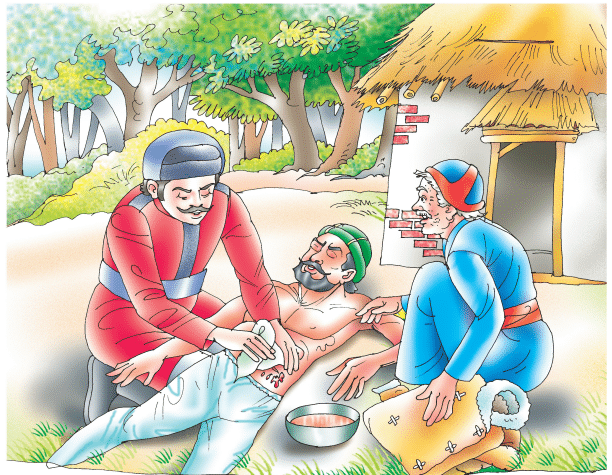
Q6:
(i) Who was the bearded man?
Ans: The bearded man was an enemy of the king. He sought revenge because the king had executed his brother and taken his property. This act of injustice drove him to plot against the king.
(ii) Why did he ask for the king's forgiveness?
Ans: The bearded man sought the king's forgiveness because he had initially planned to kill him in revenge for the execution of his brother and the seizure of his property. However, after the king saved his life by treating his wounds, the man recognized that the king had shown him kindness rather than enmity. Grateful for the king's actions, he realized his earlier intentions were misguided and wished to make amends. He expressed a desire to serve the king as his most faithful servant and promised to encourage his sons to do the same. This demonstrated his wish to move beyond hostility and establish a positive relationship with the king.
Q7: The king forgave the bearded man. What did he do to show his forgiveness?
Ans: The king showed his forgiveness by sending his servants and his own doctor to care for the bearded man. He also promised to return the man's property, demonstrating his willingness to make amends and restore what was lost.
Q8: What were the hermit's answers to the three questions? Write each answer separately. Which answer do you like most, and why?
Ans: Here are the hermit's answers to the three questions
What is the right time to begin something?
The hermit explained that the most important time is "Now." This is because it is the only moment when we have the power to act and make a difference.Which people should the king listen to?
The hermit stated that the most necessary person is the one you are with at a particular moment. This means that we should focus on the people around us and pay attention to their needs and concerns.What is the most important thing for him to do?
The hermit said that the most important business is to do good to the person you are with. He emphasized that our purpose in life is to help others.- Personal Preference: I like the hermit's answer to the second question the most: "The most necessary person is the one you are with at a particular moment." This answer resonates with me because it highlights the importance of being present and valuing our relationships. It reminds us that every interaction can be meaningful and that we should give our full attention to those around us. This perspective encourages kindness and empathy, which are essential in our daily lives.
 Q1: Match items in List A with their meanings in List B.
Q1: Match items in List A with their meanings in List B.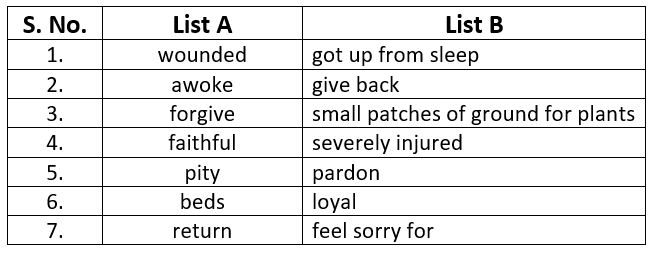
Use any three of the above words in sentences of your own. You may change the form of the word.
Ans:
Sentences:
(i) I will ask my parents to forgive me for my bad behaviour.
(ii) I thank you all for your hard and faithful service.
(iii) I am feeling pity for my shameful act.
Q2: Each of the following sentences has two blanks. Fill in the blanks with appropriate forms of the word given in brackets.
(i) The _______ said that only fresh evidence would make him change his _______. (judge)
Ans: The judge said that only fresh evidence would make him change his judgement.
NCERT Textbook Page No. 16
(ii) I didn't notice any serious _______ of opinion among the debaters, although they ______ from one another over small points. (differ)
Ans: I didn't notice any serious difference of opinion among the debaters, although they differed from one another over small points.(iii) It's a fairly simple question to _______, but will you accept my _______ as final? (answer)
Ans: It's a fairly simple question to answer, but will you accept my answer as final?(iv) It isn't _______ that _______ should always be the mother of invention. (necessary)
Ans: It isn't necessary that necessity should always be the mother of invention.(v) Hermits are _______ men. How they acquire their _______ no one can tell. (wise)
Ans: Hermits are wise men. How they acquire their wisdom no one can tell.(vi) The committee has _______ to make Jagdish captain of the team. The _______ is likely to please everyone. (decide)
Ans: The committee has decided to make Jagdish captain of the team. The decision is likely to please everyone.(vii) Asking for ________ is as noble as willingness to ________. (forgive)
Ans: Asking for forgiveness is as noble as willingness to forgive.

Q.1. Imagine you are the king. Narrate the incident of your meeting the hermit. Begin like this: The wise men answered my questions, but I was not satisfied with their answers. One day I decided to go and meet the hermit...
Ans:
As the King
The wise men answered my questions, but I was not satisfied with their answers. One day, I decided to go and meet the hermit, hoping to find the wisdom I sought. I travelled to his secluded hut in the forest, where the air was filled with the sweet scent of flowers. When I arrived, I saw the hermit digging in his garden, dressed in simple clothes. I approached him respectfully and asked my questions. However, he did not respond immediately; instead, he continued working. Frustrated, I waited patiently, realising that perhaps the hermit valued action over words. Eventually, he paused and looked at me. I shared my thoughts about the importance of the right time, the right people to listen to, and the most important task for a king. To my surprise, he answered each question with profound simplicity and clarity. His wisdom revealed that the present moment, the person before you, and doing good to others were the keys to understanding life’s purpose. I left feeling enlightened and grateful for the encounter, realising that true wisdom often lies in the simplest of truths.
Q.2. Imagine you are the hermit. Write briefly the incident of your meeting the king. Begin like this: One day I was digging in my garden. A man in ordinary clothes came to see me. I knew it was the king...
Ans:
As the Hermit
One day, I was digging in my garden when a man in ordinary clothes approached me. I recognised him as the king, despite his disguise. He came with a serious expression, eager to find answers to his pressing questions. I noticed the weight of his royal duties on him. Instead of responding immediately, I continued my work, believing that patience might offer him a valuable lesson. After a while, I paused to listen to his questions regarding the right time for actions, the people he should pay attention to, and his most important duty as a king. I shared my thoughts, highlighting the importance of the present moment, the value of those around us, and the need to do good for others. I aimed to help him understand that true wisdom lies not in complicated theories but in simple, compassionate actions. After our conversation, I observed a shift in his attitude; he appeared lighter, as if he had gained a new understanding. I felt fulfilled, knowing I had imparted something meaningful to him.

No, ostriches do not actually stick their heads in the sand to hide from enemies. This misconception likely originated from their behavior when they feel threatened. Here’s what happens:
Defense Mechanism: When faced with danger, an ostrich may lie low to the ground and stretch its neck flat against the soil. This posture can help it blend into its surroundings and avoid detection.
Nesting Behavior: Ostriches also dig shallow holes in the ground for their nests, where they might lower their heads to cover the eggs. Observers may have misinterpreted this action as the bird hiding its head in the sand.
Flight Response: Ostriches are large and powerful birds, and when they feel threatened, they are more likely to run away than to hide. They can run at speeds of up to 45 miles per hour (72 km/h).
In summary, the idea that ostriches bury their heads in the sand is a myth. Their actual behavior is a clever adaptation to avoid predators.
|
19 videos|254 docs|38 tests
|
FAQs on NCERT Solutions for Class 7 English - Three Questions
| 1. What are the main themes discussed in the NCERT Class 7 textbook? |  |
| 2. How can I effectively prepare for my Class 7 exams based on the NCERT textbook? |  |
| 3. Are NCERT solutions available for all subjects in Class 7? |  |
| 4. What is the importance of NCERT textbooks in the Class 7 curriculum? |  |
| 5. How often should I review the content from the NCERT textbook to retain information effectively? |  |

